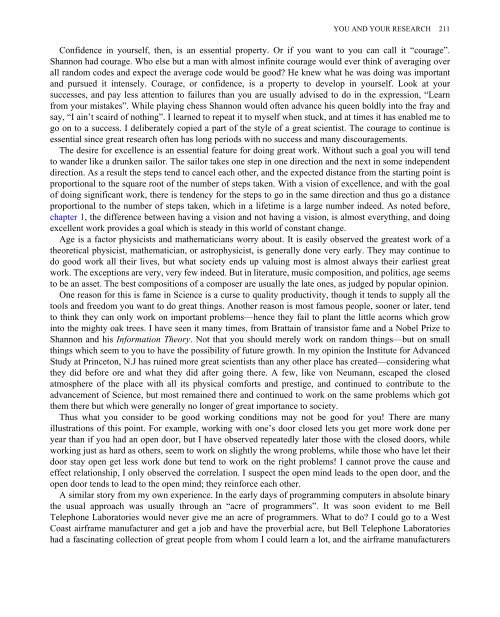hamming
hamming
hamming
You also want an ePaper? Increase the reach of your titles
YUMPU automatically turns print PDFs into web optimized ePapers that Google loves.
YOU AND YOUR RESEARCH 211Confidence in yourself, then, is an essential property. Or if you want to you can call it “courage”.Shannon had courage. Who else but a man with almost infinite courage would ever think of averaging overall random codes and expect the average code would be good? He knew what he was doing was importantand pursued it intensely. Courage, or confidence, is a property to develop in yourself. Look at yoursuccesses, and pay less attention to failures than you are usually advised to do in the expression, “Learnfrom your mistakes”. While playing chess Shannon would often advance his queen boldly into the fray andsay, “I ain’t scaird of nothing”. I learned to repeat it to myself when stuck, and at times it has enabled me togo on to a success. I deliberately copied a part of the style of a great scientist. The courage to continue isessential since great research often has long periods with no success and many discouragements.The desire for excellence is an essential feature for doing great work. Without such a goal you will tendto wander like a drunken sailor. The sailor takes one step in one direction and the next in some independentdirection. As a result the steps tend to cancel each other, and the expected distance from the starting point isproportional to the square root of the number of steps taken. With a vision of excellence, and with the goalof doing significant work, there is tendency for the steps to go in the same direction and thus go a distanceproportional to the number of steps taken, which in a lifetime is a large number indeed. As noted before,chapter 1, the difference between having a vision and not having a vision, is almost everything, and doingexcellent work provides a goal which is steady in this world of constant change.Age is a factor physicists and mathematicians worry about. It is easily observed the greatest work of atheoretical physicist, mathematician, or astrophysicist, is generally done very early. They may continue todo good work all their lives, but what society ends up valuing most is almost always their earliest greatwork. The exceptions are very, very few indeed. But in literature, music composition, and politics, age seemsto be an asset. The best compositions of a composer are usually the late ones, as judged by popular opinion.One reason for this is fame in Science is a curse to quality productivity, though it tends to supply all thetools and freedom you want to do great things. Another reason is most famous people, sooner or later, tendto think they can only work on important problems—hence they fail to plant the little acorns which growinto the mighty oak trees. I have seen it many times, from Brattain of transistor fame and a Nobel Prize toShannon and his Information Theory. Not that you should merely work on random things—but on smallthings which seem to you to have the possibility of future growth. In my opinion the Institute for AdvancedStudy at Princeton, N.J has ruined more great scientists than any other place has created—considering whatthey did before ore and what they did after going there. A few, like von Neumann, escaped the closedatmosphere of the place with all its physical comforts and prestige, and continued to contribute to theadvancement of Science, but most remained there and continued to work on the same problems which gotthem there but which were generally no longer of great importance to society.Thus what you consider to be good working conditions may not be good for you! There are manyillustrations of this point. For example, working with one’s door closed lets you get more work done peryear than if you had an open door, but I have observed repeatedly later those with the closed doors, whileworking just as hard as others, seem to work on slightly the wrong problems, while those who have let theirdoor stay open get less work done but tend to work on the right problems! I cannot prove the cause andeffect relationship, I only observed the correlation. I suspect the open mind leads to the open door, and theopen door tends to lead to the open mind; they reinforce each other.A similar story from my own experience. In the early days of programming computers in absolute binarythe usual approach was usually through an “acre of programmers”. It was soon evident to me BellTelephone Laboratories would never give me an acre of programmers. What to do? I could go to a WestCoast airframe manufacturer and get a job and have the proverbial acre, but Bell Telephone Laboratorieshad a fascinating collection of great people from whom I could learn a lot, and the airframe manufacturers


